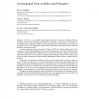Free Online Productivity Tools
i2Speak
i2Symbol
i2OCR
iTex2Img
iWeb2Print
iWeb2Shot
i2Type
iPdf2Split
iPdf2Merge
i2Bopomofo
i2Arabic
i2Style
i2Image
i2PDF
iLatex2Rtf
Sci2ools
AIL
1998
1998
An Integrated View on Rules and Principles
In the law, it is generally acknowledged that there are intuitive differences between reasoning with rules and reasoning with principles. For instance, a rule seems to lead directly to its conclusion if its condition is satisfied, while a principle seems to lead merely to a reason for its conclusion. However, the implications of these intuitive differences for the logical status of rules and principles remain controversial. A radical opinion has been put forward by Dworkin (1978). The intuitive differences led him to argue for a strict logical distinction between rules and principles. Ever since, there has been a controversy whether the intuitive differences between rules and principles require a strict logical distinction between the two. For instance, Soeteman (1991) disagrees with Dworkin’s opinion, and argues that rules and principles cannot be strictly distinguished, and do not have a different logical structure. In this paper, we claim that the differences between rules and pr...
Related Content
| Added | 21 Dec 2010 |
| Updated | 21 Dec 2010 |
| Type | Journal |
| Year | 1998 |
| Where | AIL |
| Authors | Bart Verheij, Jaap Hage, H. Jaap van den Herik |
Comments (0)

